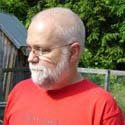[1.] I accept the definition you offer, for Wittgenstein, of primitive. It may have been just a tangent on my part to pursue the problem of definition. As with you, the word primitive usually raises a red flag with me. I think by "elemental" I was suggesting something like "simple." And, as you point out, Wittgenstein is developing, in his way, the notion that language is not simple. Hadn't he spent most of WWI, under horrific conditions, scratching notes in a little book, hoping to demonstrate that language was reducible to propositions about pictures, only to discover, slowly & painstakingly--& with ruthless honesty--that such a description of language would not stand? The nostalgia for Augustine's picture of the infant in the bosom of the family is also a nostalgia for Wittgenstein's own lost certainty about the simplicity of language. (Aside: There seems to have been a moment of rich cultural self-confidence in Vienna in the decade before WWI--a self-confidence that gave rise to Klimt, Webern, Berg, Freud, Schoenberg. And Wittgenstein. Music & philosophy & the visual imagination--all reinvented. (Second Aside: Fraiser possesed an astonishing intellect typical of the great Victorian mania for collecting things; he also structured his collections--of customs, myth, religious practice--in a typically Victorian manner that valorized Progress. One thinks of Francis Fukuyama & the purported end of history.)
You still have a 5th grade paper on Teddy Roosevelt? I admire this.
Philosophical Investigations
Christopher Robinson & Joseph Duemer read Wittgenstein's Philosophical Investigations


0 Comments:
Post a Comment
<< Home